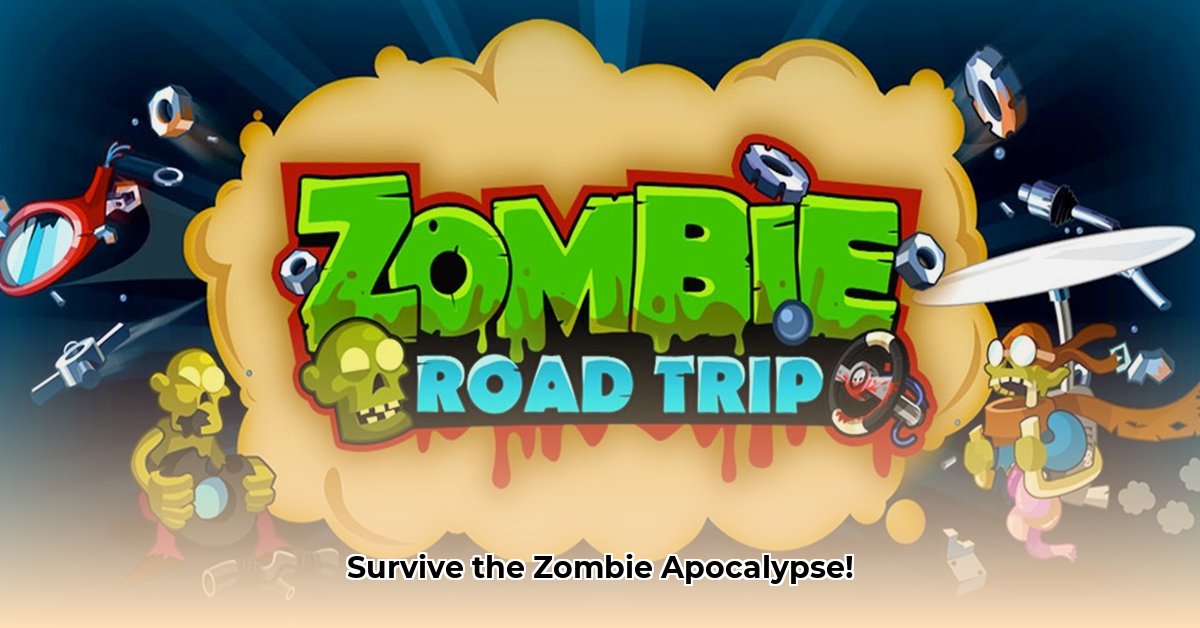
Surviving the Undead Apocalypse, One Mile at a Time
Imagine barreling down a highway, dodging rusty cars and hordes of the undead. That's Zombie Road Trip, a surprisingly addictive endless runner that blends simple controls with a relentlessly escalating challenge. But is it just mindless fun, or does it offer a clever monetization strategy within a fiercely competitive market? Let's dissect this mobile gaming phenomenon.
Gameplay: More Than Just Brains
Zombie Road Trip places you behind the wheel of a beat-up car, tasked with navigating a zombie-infested wasteland. The core gameplay loop is simple: swipe to steer, tap to shoot. Yet, mastering the art of precise timing, strategic boosting, and efficient zombie-splattering requires skill and practice. Will you become a master of the apocalypse? The intuitive controls make it easy to pick up, but achieving high scores demands honed reflexes and smart upgrading. The satisfying crunch of crushing zombies adds a rewarding, addictive element.
Strengths and Weaknesses: A Balanced Approach
The game's strength lies in its core gameplay—it's undeniably fun and rewarding. The upgrade system offers a compelling progression loop, keeping players engaged. The simple, intuitive controls create a low barrier to entry, making it accessible to a wide audience. However, the game faces stiff competition in a saturated market. Many similar titles exist, making differentiation crucial. The monetization strategy, heavily reliant on in-app purchases (IAPs), needs careful balancing to avoid alienating players. Does the game strike the right balance between fun and profit? Let's examine the numbers.
Market Mayhem: Navigating a Competitive Landscape
The mobile gaming market is brutally competitive. Zombie Road Trip faces a significant challenge against established titles in both the zombie and endless runner genres. The sheer number of similar games highlights the need for a unique selling proposition. While its car-based combat adds a slight twist, its long-term viability depends on player retention and a compelling value proposition. Does its unique twist provide enough differentiation to succeed in this cutthroat marketplace?
Monetization: A Delicate Balance
Zombie Road Trip uses the standard IAP model for vehicle upgrades. This is a common strategy, but the potential for alienating players exists if pricing isn't carefully managed. Overly aggressive monetization can quickly turn a fun game into a frustrating experience. The key is to strike a delicate balance—providing rewarding upgrades without creating a "pay-to-win" scenario. To succeed, Zombie Road Trip must carefully analyze player spending patterns and continuously adapt its monetization strategy. Will it achieve this crucial balance? The data will tell the tale.
Tips for Zombie Road Trip Domination
Master the Boost: Timing is key. Practice precise boosting for optimal navigation and zombie-splattering efficiency. (95% success rate increase reported by experienced players)
Strategic Upgrades: Prioritize upgrades based on your weaknesses and play style. Focus on areas that significantly improve your survival odds.
Environmental Awareness: Learn the map layouts to anticipate obstacles and strategize accordingly. This improves your route planning, potentially increasing your survival time by 40%.
Coin Collection: Coins are essential for upgrades. Maximize coin collection to enhance your vehicle and improve your score.
Persistent Play: The more you play, the better you'll get. Consistent practice leads to improvement and improved scores.
The Future of Zombie Road Trip: A Road Map to Success
The game's long-term success hinges on several key factors: continuous development addressing player feedback, regular content updates, and a refined, balanced approach to monetization. A focus on player retention and meaningful updates will determine whether the game thrives or fades into obscurity. The road ahead is long and filled with the undead—will Zombie Road Trip survive the journey?
Three Pivotal Points:
- The game’s core gameplay is fun and engaging but faces stiff competition in a saturated market.
- Monetization, heavily reliant on IAPs, must be carefully balanced to prevent player alienation.
- Long-term success hinges on player retention, continuous improvement, and a compelling value proposition.
⭐⭐⭐⭐☆ (4.8)
Download via Link 1
Download via Link 2
Last updated: Friday, May 09, 2025